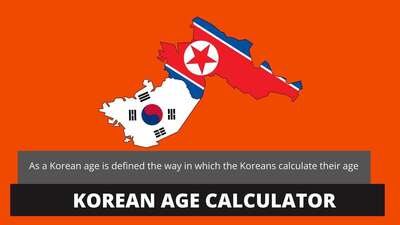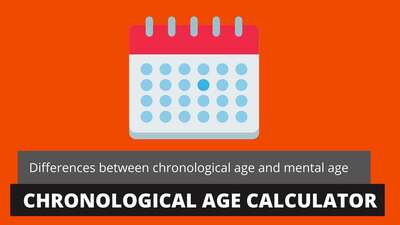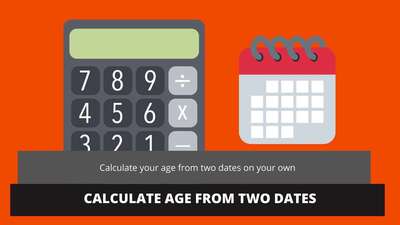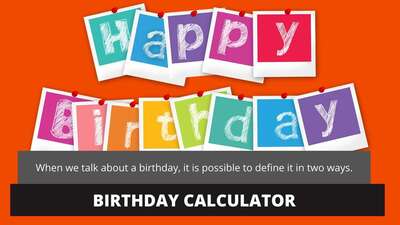How old am I if I was born on February 5 1940? It is a commonly asked question. All of us want to know our age, regardless of whether we are young or old. To know how old we are is also needed in some cases. Somebody can ask us about it in school, work or in the office. So today is the day in which we are going to dispel all your doubts and give you an exact answer to the question of how old am I if I was born on February 5 1940.
In this article, you will learn how you can calculate your age – both on your own and with the use of a special tool. A little tidbit – you will see how to calculate your age with an accuracy of years, years and months and also years, months and days! So as you see, it will be such exact calculations. So it’s time to start.
I was born on February 5 1940. How old am I?
You were born on February 5 1940. We are sure that if somebody will ask you how old you are, you can answer the question. And we are pretty sure that the answer will be limited to years only. Are we right?
And of course, the answer like that is totally sufficient in most cases. People usually want to know the age given only in years, just for the general orientation. But have you ever wondered what your exact age is? It means the age given with an accuracy of years, months and even days? If not, you couldn't have chosen better.
Here you will finally see how to calculate your exact age and, of course, know the answer. What do you think – your exact age varies significantly from your age given in years only or not? Read the article and see if you are right!
How to calculate my age if I was born on February 5 1940?
Before we will move to the step by step calculations, we want to explain to you the whole process. It means, in this part we will show you how to calculate my age if I was born on February 5 1940 in a theoretical way.
To know how old you are if you were born on February 5 1940, you need to make calculations in three steps. Why are there so many steps? Of course, you can try to calculate it at once, but it will be a little complicated. It is so easier and quicker to divide the calculations into three. So let’s see these steps.
If you were born on February 5 1940, the first step will be calculating how many full years you are alive. What does ‘full years’ mean? To know the number of full years, you have to pay attention to the day and month of your birth. Only when this day and month have passed in the current year, you can say that you are one year older. If not, you can’t count this year as a full, and calculate full years only to the year before.
The second step is calculating the full, remaining months. It means the months which have left after calculating full years. Of course, this time, you also have to pay attention to your day of birth. You can count only these months, in which the date of your birth has passed. If in some month this date has not passed, just leave it for the third step.
The third step is to calculate the days which have left after calculating full years and full months. It means, these are days which you can’t count to full months in the second step. In some cases, when today is the same number as in the day in which you were born, you can have no days left to count.
So if you know how it looks in theory, let’s try this knowledge in practice. Down below, you will see these three steps with practical examples and finally know how old you are if you were born on February 5 1940.
Calculate full years since February 5 1940
The first step is calculating full years. So you were born on February 5 1940, and today is February 18 2026. First you need to do is checking if the 5th of February has passed this year. This is the 18th of February, so February was a few months before. It means you can calculate full years from the year of birth to the current year.
So how does the calculations look?
2026 - 1940 = 86
As you can see, you require subtracting the year of your birth from the current year. In this case, the result is 86. So it means that you are 86 years old now!
In some cases it will be sufficient to know your age only in years, but here you will know your exact age, so let’s move on.
Remaining months since February 5 1940 to now
The second step is to calculate full, remaining months. You were born on February 5 1940, today is February 18 2026. You know that there are 86 full years. So now let’s focus on months. To calculate only full months, you need to pay attention to the day of your birth. It’s 5th February. So now you require checking if 18th February has passed this year. If today is 18th of February, it means yes, 5th of February has passed. So you will calculate full months from February to February.
To make calculations, it will be better to mark months as numbers. February is the 2th month of the year, so mark it just as 0, and February is the 86th month of the year, so mark it just as 86. And now you can calculate the full, remaining months.
The calculations look as follows:
2 - 2 = 0
So you need to subtract the smaller number, in this case 0, from the bigger one, in this case 86. And then you have the result – it is 0 months. So now we know that if you were born on February 5 1940 you are 86 years and 0 months old. But what about days? Let’s check it!
Days left since February 5 1940 to now
The third, last step, is calculating the number of days which have left after previous calculations from the first and second step. There is no surprise, this time you also need to pay attention to the day of your birth. You were born on February 5 1940, today is February 18 2026. You have calculated full years, from 1940 to 2026, and full months, from February to February. It means you need to count only the days from February.
You were born on the 5th. Today is the 18th. So the calculations will be quite easy. You need to just subtract 5 from the 18 to see the number of days. The calculations will look like this:
So there are 14 full days left.
So to sum up – there are 86 full years, 0 full months and 14 days. So it means you are 86 years, 0 months and 14 days old exactly!
How Old Calculator dedicated to calculate how old you are if you were born on February 5 1940
Have you scrolled all parts containing calculations to know the easier way to know your age if you were born on February 5 1940?Don’t worry. We understand it. Here you are! We also prepared something for people who don’t like calculating on their own. Or just those who like to get the result as fast as possible, with almost no effort.
So what do we have for you? It is the how old calculator – online calculator dedicated to calculate how old you are if you were born on February 5 1940. It is, of course, math based. It contains the formulas, but you don’t see them. You only see the friendly-looking interface to use.
How can you use the how old calculator? You don’t need to have any special skills. Moreover, you don’t even need to do almost anything. You just need to enter the data, so you need to enter the date of your birth – day, month and year. Less than a second is totally sufficient for this tool to give you an exact result. Easy? Yup, as it looks!
There are more good pieces of information. The how old calculator is a free tool. It means you don’t have to pay anything to use it. Just go on the page and enjoy! You can use it on your smartphone, tablet or laptop. It will work as well on every device with an Internet connection.
So let’s try it on your own and see how fast and effortlessly you can get the answer to how old are you if you were born on February 5 1940.
Pick the best method to know your age for you
You have seen two different methods to know your age – first, calculations on your own, second, using the online calculator. It is time to pick the method for you. You could see how it works in both of them. You could try to calculate your exact age following our three steps and also use our app. So we are sure that now you have your favorite.
Both these methods are dedicated for different people and different needs. We gathered them in one article to show you the differences between them and give you the choice. So, if you need, read the previous paragraphs again, and enjoy calculations – regardless of whether you will make them on your own or using our how old calculator.
Do you feel old or young?
We are very curious what you think about your age now, when you finally know the exact numbers. Do you feel old or young? We are asking it because so many people, so many minds. All of you can feel the age differently, even if it is so similar or the same age! And we think it’s beautiful that all of us are different.
Regardless of feeling old or young, what do you feel more when you think about your age? What do you think about your life so far? We encourage you to make some kinds of summaries once in a while. Thanks to this, you will be able to check if your dream has come true, or maybe you need to fight more to reach your goal. Or maybe, after some thought, you will decide to change your life totally. Thinking about our life, analyzing our needs and wants – these things are extremely important to live happily.
Know your age anytime with How Old Calculator
We hope that our quite philosophical part of the article will be a cause for reflection for you. But let’s get back to the main topic, or, to be honest, the end of this topic. Because that’s the end of our article. Let’s sum up what you have learned today.
I was born on February 5 1940. How old am I? We are sure that such a question will not surprise you anymore. Now you can calculate your age, even exact age, in two different ways. You are able to make your own calculations and also know how to make it quicker and easier with the how old calculator.
It is time for your move. Let’s surprise your friends or family with the accuracy of your answers! Tell them how old you are with an accuracy of years, months and days!
Check also our other articles to check how old are your family members or friends. Pick their birthdate, see the explanation and get the results.
| Invariant Language (Invariant Country) | Monday, 05 February 1940 |
| Afrikaans | Maandag 05 Februarie 1940 |
| Aghem | tsuʔukpà 5 ndzɔ̀ŋɔ̀kƗ̀zùʔ 1940 |
| Akan | Dwowda, 1940 Kwakwar-Ɔgyefuo 05 |
| Amharic | 1940 ፌብሩወሪ 5, ሰኞ |
| Arabic | الاثنين، 5 فبراير 1940 |
| Assamese | সোমবাৰ, 5 ফেব্ৰুৱাৰী, 1940 |
| Asu | Jumatatu, 5 Februari 1940 |
| Asturian | llunes, 5 de febreru de 1940 |
| Azerbaijani | 5 fevral 1940, bazar ertəsi |
| Azerbaijani | 5 феврал 1940, базар ертәси |
| Azerbaijani | 5 fevral 1940, bazar ertəsi |
| Basaa | ŋgwà njaŋgumba 5 Màcɛ̂l 1940 |
| Belarusian | панядзелак, 5 лютага 1940 г. |
| Bemba | Palichimo, 5 Februari 1940 |
| Bena | pa shahuviluha, 5 pa mwedzi gwa wuvili 1940 |
| Bulgarian | понеделник, 5 февруари 1940 г. |
| Bambara | ntɛnɛ 5 feburuye 1940 |
| Bangla | সোমবার, 5 ফেব্রুয়ারী, 1940 |
| Tibetan | 1940 ཟླ་བ་གཉིས་པའི་ཚེས་5, གཟའ་ཟླ་བ་ |
| Breton | Lun 5 Cʼhwevrer 1940 |
| Bodo | समबार, फेब्रुवारी 5, 1940 |
| Bosnian | ponedjeljak, 5. februar 1940. |
| Bosnian | понедјељак, 05. фебруар 1940. |
| Bosnian | ponedjeljak, 5. februar 1940. |
| Catalan | dilluns, 5 de febrer de 1940 |
| Chakma | 𑄥𑄧𑄟𑄴𑄝𑄢𑄴, 5 𑄜𑄬𑄛𑄴𑄝𑄳𑄢𑄪𑄠𑄢𑄨, 1940 |
| Chechen | 1940 февраль 5, оршот |
| Cebuano | Lunes, Pebrero 5, 1940 |
| Chiga | Orwokubanza, 5 Okwakabiri 1940 |
| Cherokee | ᎤᎾᏙᏓᏉᏅᎯ, ᎧᎦᎵ 5, 1940 |
| Central Kurdish | 1940 شوبات 5, دووشەممە |
| Czech | pondělí 5. února 1940 |
| Welsh | Dydd Llun, 5 Chwefror 1940 |
| Danish | mandag den 5. februar 1940 |
| Taita | Kuramuka jimweri, 5 Mori ghwa kawi 1940 |
| German | Montag, 5. Februar 1940 |
| Zarma | Atinni 5 Feewiriye 1940 |
| Lower Sorbian | pónjeźele, 5. februara 1940 |
| Duala | mɔ́sú 5 ŋgɔndɛ 1940 |
| Jola-Fonyi | Teneŋ 5 Fébirie 1940 |
| Dzongkha | གཟའ་མིག་དམར་, སྤྱི་ལོ་1940 ཟླ་གཉིས་པ་ ཚེས་05 |
| Embu | Njumatatu, 5 Mweri wa kaĩri 1940 |
| Ewe | dzoɖa, dzodze 5 lia 1940 |
| Greek | Δευτέρα, 5 Φεβρουαρίου 1940 |
| English | Monday, February 5, 1940 |
| Esperanto | lundo, 5-a de februaro 1940 |
| Spanish | lunes, 5 de febrero de 1940 |
| Estonian | esmaspäev, 5. veebruar 1940 |
| Basque | 1940(e)ko otsailaren 5(a), astelehena |
| Ewondo | mɔ́ndi 5 ngɔn bɛ̌ 1940 |
| Persian | 1318 بهمن 15, دوشنبه |
| Fulah | aaɓnde 5 colte 1940 |
| Fulah | aaɓnde 5 colte 1940 |
| Finnish | maanantai 5. helmikuuta 1940 |
| Filipino | Lunes, Pebrero 5, 1940 |
| Faroese | mánadagur, 5. februar 1940 |
| French | lundi 5 février 1940 |
| Friulian | lunis 5 di Fevrâr dal 1940 |
| Western Frisian | moandei 5 Febrewaris 1940 |
| Irish | Dé Luain 5 Feabhra 1940 |
| Scottish Gaelic | DiLuain, 5mh dhen Ghearran 1940 |
| Galician | Luns, 5 de febreiro de 1940 |
| Swiss German | Määntig, 5. Februar 1940 |
| Gujarati | સોમવાર, 5 ફેબ્રુઆરી, 1940 |
| Gusii | Chumatato, 5 Feburari 1940 |
| Manx | 1940 Toshiaght-arree 5, Jelhein |
| Hausa | Litinin 5 Faburairu, 1940 |
| Hawaiian | Poʻakahi, 5 Pepeluali 1940 |
| Hebrew | יום שני, 5 בפברואר 1940 |
| Hindi | सोमवार, 5 फ़रवरी 1940 |
| Croatian | ponedjeljak, 5. veljače 1940. |
| Upper Sorbian | póndźela, 5. februara 1940 |
| Hungarian | 1940. február 5., hétfő |
| Armenian | 1940 թ. փետրվարի 5, երկուշաբթի |
| Interlingua | lunedi le 5 de februario 1940 |
| Indonesian | Senin, 05 Februari 1940 |
| Igbo | Mọnde, 5 Febrụwarị 1940 |
| Sichuan Yi | 1940 ꑍꆪ 5, ꆏꊂꋍ |
| Icelandic | mánudagur, 5. febrúar 1940 |
| Italian | lunedì 5 febbraio 1940 |
| Japanese | 1940年2月5日月曜日 |
| Ngomba | Mɔ́ndi, 1940 Pɛsaŋ Pɛ́pá 05 |
| Machame | Jumatatuu, 5 Februari 1940 |
| Javanese | Senin, 5 Februari 1940 |
| Georgian | ორშაბათი, 05 თებერვალი, 1940 |
| Kabyle | Sanass 5 Fuṛar 1940 |
| Kamba | Wa kwambĩlĩlya, 5 Mwai wa kelĩ 1940 |
| Makonde | Liduva lyatatu, 5 Mwedi wa Pili 1940 |
| Kabuverdianu | sigunda-fera, 5 di Febreru di 1940 |
| Koyra Chiini | Atini 5 Feewiriye 1940 |
| Kikuyu | Njumatatũ, 5 Mwere wa kerĩ 1940 |
| Kazakh | 1940 ж. 5 ақпан, дүйсенбі |
| Kako | lundi 05 wanja 1940 |
| Kalaallisut | 1940 februaarip 5, ataasinngorneq |
| Kalenjin | Kotaai, 5 Ng’atyaato 1940 |
| Khmer | ចន្ទ 5 កុម្ភៈ 1940 |
| Kannada | ಸೋಮವಾರ, ಫೆಬ್ರವರಿ 5, 1940 |
| Korean | 1940년 2월 5일 월요일 |
| Konkani | सोमार 5 फेब्रुवारी 1940 |
| Kashmiri | ژٔندرٕروار, فرؤری 5, 1940 |
| Shambala | Jumaatatu, 5 Febluali 1940 |
| Bafia | lǝndí 5 ŋwíí akǝ bɛ́ɛ 1940 |
| Colognian | Mohndaach, dä 5. Fäbrowa 1940 |
| Kurdish | 1940 reşemiyê 5, duşem |
| Cornish | 1940 mis Hwevrer 5, dy Lun |
| Kyrgyz | 1940-ж., 5-февраль, дүйшөмбү |
| Langi | Jumatátu, 5 Kʉnaanɨ 1940 |
| Luxembourgish | Méindeg, 5. Februar 1940 |
| Ganda | Balaza, 5 Febwaliyo 1940 |
| Lakota | Aŋpétuwaŋži, Thiyóȟeyuŋka Wí 5, 1940 |
| Lingala | mokɔlɔ mwa yambo 5 sánzá ya míbalé 1940 |
| Lao | ວັນຈັນ ທີ 5 ກຸມພາ ຄ.ສ. 1940 |
| Northern Luri | AP 1318 Bahman 15, Mon |
| Lithuanian | 1940 m. vasario 5 d., pirmadienis |
| Luba-Katanga | Nkodya 5 Lùishi 1940 |
| Luo | Wuok Tich, 5 Dwe mar Ariyo 1940 |
| Luyia | Jumatatu, 5 Februari 1940 |
| Latvian | Pirmdiena, 1940. gada 5. februāris |
| Masai | Jumatátu, 5 Arát 1940 |
| Meru | Muramuko, 5 Feburuarĩ 1940 |
| Morisyen | lindi 5 fevriye 1940 |
| Malagasy | Alatsinainy 5 Febroary 1940 |
| Makhuwa-Meetto | Jumatatu, 5 Mweri wo unayeli 1940 |
| Metaʼ | Aneg 2, 1940 imeg àbùbì 05 |
| Maori | Rāhina, 5 Huitanguru 1940 |
| Macedonian | понеделник, 5 февруари 1940 |
| Malayalam | 1940, ഫെബ്രുവരി 5, തിങ്കളാഴ്ച |
| Mongolian | 1940 оны хоёрдугаар сарын 5, Даваа гараг |
| Marathi | सोमवार, 5 फेब्रुवारी, 1940 |
| Malay | Isnin, 5 Februari 1940 |
| Maltese | It-Tnejn, 5 ta’ Frar 1940 |
| Mundang | Comlaaɗii 5 Cokcwaklaŋne 1940 |
| Burmese | 1940၊ ဖေဖော်ဝါရီ 5၊ တနင်္လာ |
| Mazanderani | AP 1318 Bahman 15, Mon |
| Nama | Mantaxtsees, 5 ǃKhanǀgôab 1940 |
| Norwegian Bokmål | mandag 5. februar 1940 |
| North Ndebele | Mvulo, 5 Nhlolanja 1940 |
| Low German | 1940 M02 5, Mon |
| Nepali | 1940 फेब्रुअरी 5, सोमबार |
| Dutch | maandag 5 februari 1940 |
| Kwasio | mɔ́ndɔ 5 ngwɛn ńmba 1940 |
| Norwegian Nynorsk | måndag 5. februar 1940 |
| Ngiemboon | mvfò lyɛ̌ʼ , lyɛ̌ʼ 5 na saŋ kàg ngwóŋ, 1940 |
| Nuer | Jiec la̱t 5 Pɛt 1940 |
| Nyankole | Orwokubanza, 5 Okwakabiri 1940 |
| Oromo | Wiixata, Guraandhala 5, 1940 |
| Odia | ସୋମବାର, ଫେବୃଆରୀ 5, 1940 |
| Ossetic | Къуырисӕр, 5 февралы, 1940 аз |
| Punjabi | ਸੋਮਵਾਰ, 5 ਫ਼ਰਵਰੀ 1940 |
| Punjabi | پیر, 05 فروری 1940 |
| Punjabi | ਸੋਮਵਾਰ, 5 ਫ਼ਰਵਰੀ 1940 |
| Polish | poniedziałek, 5 lutego 1940 |
| Pashto | دونۍ د AP 1318 د سلواغه 15 |
| Portuguese | segunda-feira, 5 de fevereiro de 1940 |
| Quechua | Lunes, 5 Febrero, 1940 |
| Romansh | glindesdi, ils 5 da favrer 1940 |
| Rundi | Ku wa mbere 5 Ruhuhuma 1940 |
| Romanian | luni, 5 februarie 1940 |
| Rombo | Ijumatatu, 5 Mweri wa kaili 1940 |
| Russian | понедельник, 5 февраля 1940 г. |
| Kinyarwanda | 1940 Gashyantare 5, Kuwa mbere |
| Rwa | Jumatatuu, 5 Februari 1940 |
| Sakha | 1940 сыл Олунньу 5 күнэ, бэнидиэнньик |
| Samburu | Mderot ee kuni, 5 Lapa le waare 1940 |
| Sangu | Jumatatu, 5 Mwitope 1940 |
| Sindhi | 1940 فيبروري 5, سومر |
| Northern Sami | 1940 guovvamánnu 5, vuossárga |
| Sena | Chiposi, 5 de Fevreiro de 1940 |
| Koyraboro Senni | Atinni 5 Feewiriye 1940 |
| Sango | Bïkua-ûse 5 Fulundïgi 1940 |
| Tachelhit | ⴰⵢⵏⴰⵙ 5 ⴱⵕⴰⵢⵕ 1940 |
| Tachelhit | aynas 5 bṛayṛ 1940 |
| Tachelhit | ⴰⵢⵏⴰⵙ 5 ⴱⵕⴰⵢⵕ 1940 |
| Sinhala | 1940 පෙබරවාරි 5, සඳුදා |
| Slovak | pondelok 5. februára 1940 |
| Slovenian | ponedeljek, 05. februar 1940 |
| Inari Sami | vuossargâ, kuovâmáánu 5. 1940 |
| Shona | 1940 Kukadzi 5, Muvhuro |
| Somali | Isniin, Bisha Labaad 05, 1940 |
| Albanian | e hënë, 5 shkurt 1940 |
| Serbian | понедељак, 05. фебруар 1940. |
| Serbian | понедељак, 05. фебруар 1940. |
| Serbian | ponedeljak, 05. februar 1940. |
| Swedish | måndag 5 februari 1940 |
| Swahili | Jumatatu, 5 Februari 1940 |
| Tamil | திங்கள், 5 பிப்ரவரி, 1940 |
| Telugu | 5, ఫిబ్రవరి 1940, సోమవారం |
| Teso | Nakaebarasa, 5 Omuk 1940 |
| Tajik | Душанбе, 05 Феврал 1940 |
| Thai | วันจันทร์ที่ 5 กุมภาพันธ์ พ.ศ. 2483 |
| Tigrinya | ሰኑይ፣ 05 ለካቲት መዓልቲ 1940 ዓ/ም |
| Turkmen | 5 fewral 1940 Duşenbe |
| Tongan | Mōnite 5 Fēpueli 1940 |
| Turkish | 5 Şubat 1940 Pazartesi |
| Tatar | 5 февраль, 1940 ел, дүшәмбе |
| Tasawaq | Atinni 5 Feewiriye 1940 |
| Central Atlas Tamazight | Aynas, 5 Yebrayer 1940 |
| Uyghur | 1940 5-فېۋرال، دۈشەنبە |
| Ukrainian | понеділок, 5 лютого 1940 р. |
| Urdu | پیر، 5 فروری، 1940 |
| Uzbek | dushanba, 5-fevral, 1940 |
| Uzbek | AP 1318 Bahman 15, دوشنبه |
| Uzbek | душанба, 05 феврал, 1940 |
| Uzbek | dushanba, 5-fevral, 1940 |
| Vai | ꗳꗡꘉ, 5 ꕒꕡꖝꖕ 1940 |
| Vai | tɛɛnɛɛ, 5 ɓandaɓu 1940 |
| Vai | ꗳꗡꘉ, 5 ꕒꕡꖝꖕ 1940 |
| Vietnamese | Thứ Hai, 5 tháng 2, 1940 |
| Vunjo | Jumatatuu, 5 Februari 1940 |
| Walser | Mäntag, 5. Hornig 1940 |
| Wolof | Altine, 5 Few, 1940 |
| Xhosa | 1940 Februwari 5, Mvulo |
| Soga | Balaza, 5 Febwaliyo 1940 |
| Yangben | móndie 5 siɛyɛ́, oóli ú kándíɛ 1940 |
| Yiddish | מאָנטיק, 5טן פֿעברואַר 1940 |
| Yoruba | Ajé, 5 Èrèl 1940 |
| Cantonese | 1940年2月5日 星期一 |
| Cantonese | 1940年2月5日星期一 |
| Cantonese | 1940年2月5日 星期一 |
| Standard Moroccan Tamazight | ⴰⵢⵏⴰⵙ 5 ⴱⵕⴰⵢⵕ 1940 |
| Chinese | 1940年2月5日星期一 |
| Chinese | 1940年2月5日星期一 |
| Chinese | 1940年2月5日 星期一 |
| Zulu | UMsombuluko, Februwari 5, 1940 |


















![How Old Am I if I Was Born in [Year] | Simple Formula & Tips](/images/page/400/how-to-calculate-your-age-based-on-your-birth-year-20.jpg)

